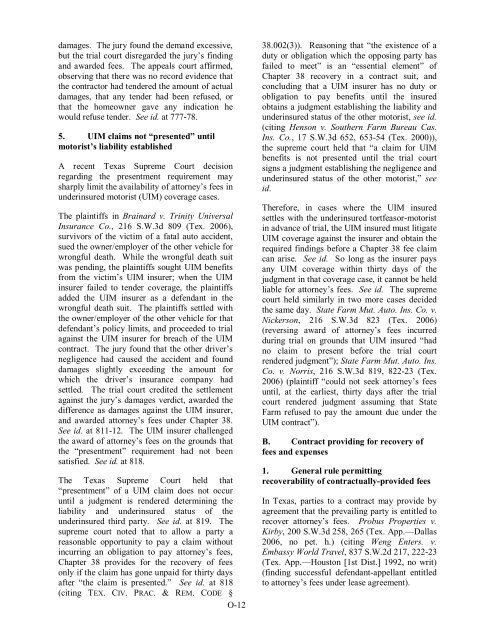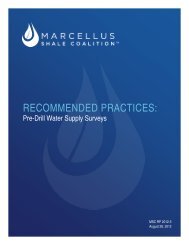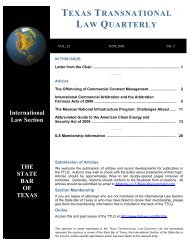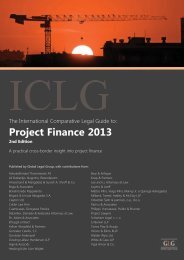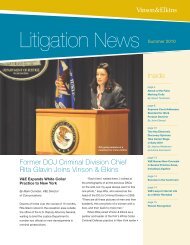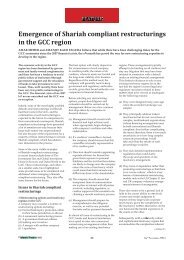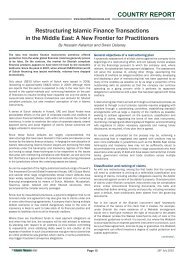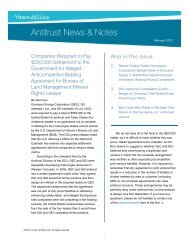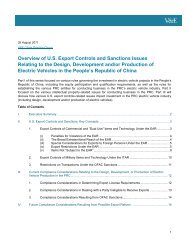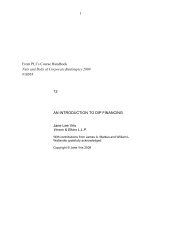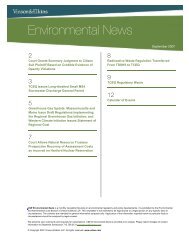Attorney's Fees Update - Vinson & Elkins LLP
Attorney's Fees Update - Vinson & Elkins LLP
Attorney's Fees Update - Vinson & Elkins LLP
You also want an ePaper? Increase the reach of your titles
YUMPU automatically turns print PDFs into web optimized ePapers that Google loves.
damages. The jury found the demand excessive,<br />
but the trial court disregarded the jury’s finding<br />
and awarded fees. The appeals court affirmed,<br />
observing that there was no record evidence that<br />
the contractor had tendered the amount of actual<br />
damages, that any tender had been refused, or<br />
that the homeowner gave any indication he<br />
would refuse tender. See id. at 777-78.<br />
5. UIM claims not “presented” until<br />
motorist’s liability established<br />
A recent Texas Supreme Court decision<br />
regarding the presentment requirement may<br />
sharply limit the availability of attorney’s fees in<br />
underinsured motorist (UIM) coverage cases.<br />
The plaintiffs in Brainard v. Trinity Universal<br />
Insurance Co., 216 S.W.3d 809 (Tex. 2006),<br />
survivors of the victim of a fatal auto accident,<br />
sued the owner/employer of the other vehicle for<br />
wrongful death. While the wrongful death suit<br />
was pending, the plaintiffs sought UIM benefits<br />
from the victim’s UIM insurer; when the UIM<br />
insurer failed to tender coverage, the plaintiffs<br />
added the UIM insurer as a defendant in the<br />
wrongful death suit. The plaintiffs settled with<br />
the owner/employer of the other vehicle for that<br />
defendant’s policy limits, and proceeded to trial<br />
against the UIM insurer for breach of the UIM<br />
contract. The jury found that the other driver’s<br />
negligence had caused the accident and found<br />
damages slightly exceeding the amount for<br />
which the driver’s insurance company had<br />
settled. The trial court credited the settlement<br />
against the jury’s damages verdict, awarded the<br />
difference as damages against the UIM insurer,<br />
and awarded attorney’s fees under Chapter 38.<br />
See id. at 811-12. The UIM insurer challenged<br />
the award of attorney’s fees on the grounds that<br />
the “presentment” requirement had not been<br />
satisfied. See id. at 818.<br />
The Texas Supreme Court held that<br />
“presentment” of a UIM claim does not occur<br />
until a judgment is rendered determining the<br />
liability and underinsured status of the<br />
underinsured third party. See id. at 819. The<br />
supreme court noted that to allow a party a<br />
reasonable opportunity to pay a claim without<br />
incurring an obligation to pay attorney’s fees,<br />
Chapter 38 provides for the recovery of fees<br />
only if the claim has gone unpaid for thirty days<br />
after “the claim is presented.” See id. at 818<br />
(citing TEX. CIV. PRAC. & REM. CODE §<br />
O-12<br />
38.002(3)). Reasoning that “the existence of a<br />
duty or obligation which the opposing party has<br />
failed to meet” is an “essential element” of<br />
Chapter 38 recovery in a contract suit, and<br />
concluding that a UIM insurer has no duty or<br />
obligation to pay benefits until the insured<br />
obtains a judgment establishing the liability and<br />
underinsured status of the other motorist, see id.<br />
(citing Henson v. Southern Farm Bureau Cas.<br />
Ins. Co., 17 S.W.3d 652, 653-54 (Tex. 2000)),<br />
the supreme court held that “a claim for UIM<br />
benefits is not presented until the trial court<br />
signs a judgment establishing the negligence and<br />
underinsured status of the other motorist,” see<br />
id.<br />
Therefore, in cases where the UIM insured<br />
settles with the underinsured tortfeasor-motorist<br />
in advance of trial, the UIM insured must litigate<br />
UIM coverage against the insurer and obtain the<br />
required findings before a Chapter 38 fee claim<br />
can arise. See id. So long as the insurer pays<br />
any UIM coverage within thirty days of the<br />
judgment in that coverage case, it cannot be held<br />
liable for attorney’s fees. See id. The supreme<br />
court held similarly in two more cases decided<br />
the same day. State Farm Mut. Auto. Ins. Co. v.<br />
Nickerson, 216 S.W.3d 823 (Tex. 2006)<br />
(reversing award of attorney’s fees incurred<br />
during trial on grounds that UIM insured “had<br />
no claim to present before the trial court<br />
rendered judgment”); State Farm Mut. Auto. Ins.<br />
Co. v. Norris, 216 S.W.3d 819, 822-23 (Tex.<br />
2006) (plaintiff “could not seek attorney’s fees<br />
until, at the earliest, thirty days after the trial<br />
court rendered judgment assuming that State<br />
Farm refused to pay the amount due under the<br />
UIM contract”).<br />
B. Contract providing for recovery of<br />
fees and expenses<br />
1. General rule permitting<br />
recoverability of contractually-provided fees<br />
In Texas, parties to a contract may provide by<br />
agreement that the prevailing party is entitled to<br />
recover attorney’s fees. Probus Properties v.<br />
Kirby, 200 S.W.3d 258, 265 (Tex. App.—Dallas<br />
2006, no pet. h.) (citing Weng Enters. v.<br />
Embassy World Travel, 837 S.W.2d 217, 222-23<br />
(Tex. App.—Houston [1st Dist.] 1992, no writ)<br />
(finding successful defendant-appellant entitled<br />
to attorney’s fees under lease agreement).


